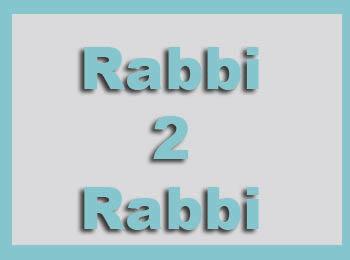Learning is just as important as attending services and social justice, and people are looking for more opportunities to engage with Jewish texts and ideas
Rabbi Avi Finegold
FOUNDER, THE JEWISH LEARNING LIBRARY, MONTREAL
Rabbi Philip Scheim
BETH DAVID B’NAI ISRAEL BETH AM CONGREGATION, TORONTO
Rabbi Finegold: I would like to continue the discussion from our last column about politics and the pulpit. Are there other topics that you think congregational rabbis should stay away from?
To put it another way, aside from ideas such as law, liturgy and spirituality, are there things that you find yourself particularly suited for in the rabbinate? Are there skills that you think people expect you to have, but are really beyond the training you received in seminary?
I for one always find myself explaining that I am an “ideas guy,” and that I like to focus on the “big picture.” Still, I know quite well that administrative skills are an essential component of the modern rabbinate, despite there not being a section of the Shulchan Aruch devoted to board management.
Rabbi Scheim: Last month, at a Rabbinical Assembly seminar, the American magazine editor Leon Wieseltier spoke compellingly of what rabbis need to address in their sermons. His answer could be summarized in one word: Torah.
Wieseltier bemoaned the prevailing tendency of rabbis to echo the editorial pages of their newspaper of choice, to focus on the issues-du-jour, rather than use their public-speaking opportunities to teach Torah. Other than a very brief allusion to a current event – unless, of course, the world, Jewish or otherwise, is facing a cataclysmic crisis, which would demand a more extensive discussion – I would agree with Wieseltier that the weekly Torah reading, the Jewish calendar, Jewish practice and tradition should be our pulpit focus.
People don’t need us for news or sports commentary, for which there are far better informed sources of information than the rabbi.
Thus, I would categorize myself as “old school.” I feel that our seminaries should focus on teaching us Torah, transforming us into the best transmitters of our tradition that we can be. Many of the other skills that we use in the rabbinate, from fundraising to counselling, rely as much on instinct and personality as they would on professional skills courses.
Yes, those skills should be taught, but the overwhelming emphasis of rabbinical training should remain in the realm of Torah.
Rabbi Finegold: I agree, and it is for this reason that I focus my work on adult education.
I feel that there are many very qualified rabbis preaching from the pulpit, counselling individuals and performing life-cycle events. Sadly, there are not as many who are involved in serious adult learning and teaching. Filling that void is what I hope to accomplish at the Jewish Learning Lab, an adult education effort that I’ve been creating.
The analogy I have been using is that many professions have continuing education credits as a requirement for their continued competence, and we should require the same of our congregants. We should see Jewish continued learning as a fundamental part of one’s religious life, equal to and alongside attending services and social justice.
Pirkei Avot equates these three aspects of Jewish life when it speaks of Torah, avodah (worship) and gemilut chasadim (acts of kindness), and we should, too. In my experience, people actually crave this kind of learning and are looking for more opportunities to engage with Jewish texts and ideas.
We should leave the punditry to pundits and focus on the thing which sets us apart as leaders. And that is, as you rightly say, Torah.
Rabbi Scheim: Clearly there is no daylight between us on this.
Serious adult learning has to be prioritized in the Jewish world. We impose educational standards on bar and bat mitzvah kids, but place few learning expectations on their parents, or on synagogue or community leaders.
We have a long distance to travel in order to achieve widespread Hebrew literacy in the greater adult Jewish world. We rabbis need to do much more to further this goal, and I commend your pioneering role in this effort.
